Paul Emerich France teaches third grade and is a National Board Certified Teacher (#NBCT) who contributes to the education conversation regarding personalized learning and social justice education.
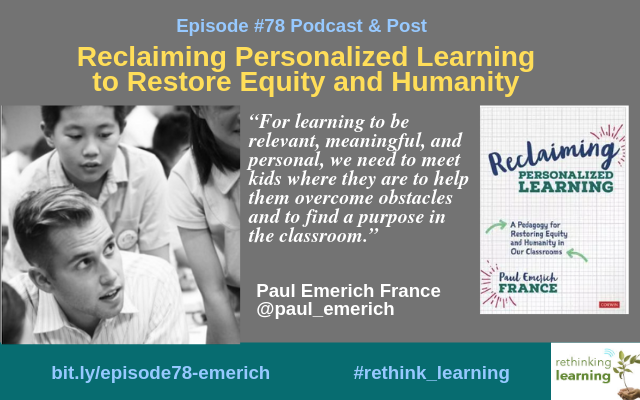
Podcast: Play in new window | Download
Paul helps debunk many of the myths of personalized learning and helps paint a picture of what personalized learning ideally looks like in the classroom. Paul shared about his new book “Reclaiming Personalized Learning: A Pedagogy for Restoring Equity and Humanity in our Classrooms” and provided some tips and strategies. I learned some great ideas from him. Hope you enjoy our conversation!
Where you grew up
I grew up in the suburbs of Chicago in a little town called Mount Prospect where friendliness is a way of life. My parents still live in the same house. I have two sisters and an older brother and everyone lives close. I had a wonderful upbringing, great teachers and great schools where I had the privilege of going to. Then I went to the University of Illinois and did my undergrad in elementary education and my masters at Roosevelt University in reading. I’m nationally board certified. I owe it all to a great family and a great place where I was able to grow up.
BPLC19 – Keynote: Paul Emerich France
What it was like for you as a student
I was like your rule follower typically on the higher achieving side student. The education system worked well for me, but it wasn’t when I became a teacher. I saw that everyone is not like me and not everyone was like me when I was growing up. It definitely shapes the way I see the classroom now. Education was really built for people who were like me growing up and that was not fair or inclusive. It has heavily impacted how I see my kids and my classroom now, and I try to build an environment that helps kids like me be successful but also helps all kids regardless of their learning preferences are needs so all kids are successful. When I was in college and realized how many life experiences I didn’t have, I learned how to think on my own for the first time. I wish that I would have had what my kids have now.
“We want our kids to leave school being autonomous, thinking critically, finding things they like to do and that they are interested in, and discovering a purpose in the classroom.”
Your journey as a writer
I first started writing on my own blog. I wanted to write a children’s book and was googling about how to become an author. That’s where I found that I needed a blog to build a following to get an agent so I started a blog about 6 and 1/2 years ago called “The Thinking Specialist.” I called it that because of the way I viewed the classroom. I’m not necessarily an expert in one content area but I feel I’m a thinking expert. My job is to teach my kids how to be critical thinkers so I need to know about metacognition and how thinking works. That’s why I called it that and then I didn’t like that name anymore. Now it is at https://paulemerich.com and call it “InspirED: Restoring Equity and Humanity.”
I was writing about how kids see themselves in the curriculum. The essence of personalization is that it is meaningful and relevant to all individuals because they can see themselves and find a purpose in it. I literally just started writing. I think that’s what anybody who wants to write just needs to start doing. You’re going to have posts that are awful and look back not believing what you wrote. Then you’re going to write things that are timeless and that you are so proud of that they are up for everyone to read. But you have to have both. This is where vulnerability comes in. You have to have the good and the bad in order to write.
Importance of Being Vulnerable
Being vulnerable is essential to learning. I have an article coming out in Educational Leadership on the Value of Vulnerability in September 2019. This is kind of the glue in our classroom. If our kids don’t feel comfortable in our classroom opening up and letting them be seen and that means the good, the bad, and the ugly, then we cannot actually reach them in a meaningful way. In order for learning to be relevant, meaningful, and personal, we need to be able to meet kids where they are and help them overcome their obstacles. We also need to find time and ways to validate and appreciate their assets as well. If we are not able to see those obstacles, then we cannot help them. I tell my kids that if they don’t know what to do, write me a note and tell me what you don’t know or need help with.
Teaching With Jillian Starr Podcast
The purpose of assessment in my classroom is that I want to know what to teach you next. I need to know what you don’t know and that’s a vulnerable position to be in to say I don’t know. Lots of kids think they should already know this stuff. I tell them “If I thought you already knew this then I would be trying to teach you about it. I’m teaching you because I think you don’t know it.” I think you can find vulnerability everywhere not just in schools but everywhere in the world. It is essential to learning. We all have obstacles and challenges that are not supposed to be a place or source of shame, it’s supposed to be where we’re all in a community where we have these things. If we know each other’s obstacles, we can actually help each other to overcome our obstacles. We also want to be vulnerable with our colleagues and even say “I don’t know” something and ask for help. What an awesome thing to be able to do!
Flexible Content & Tools: Part 3 – An Interview With an Elementary Educator
By Noah Dougherty for Education Elements
Your book “Reclaiming Personalized Learning: A Pedagogy for Restoring Equity and Humanity in Our Classrooms”
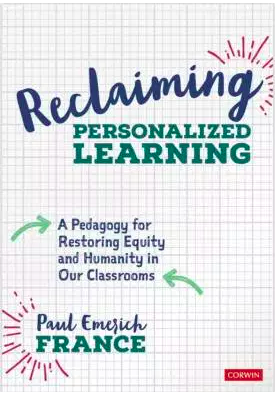 Reclaiming Personalized Learning, available October 2019 from Corwin Press, unpacks personalization in three main sections. The first section, Foundations, conceptualizes humanized personalization in three dimensions: the collective conscious, small group interactions, and the inner dialogue. In the second section, Pedagogy identifies the components of humanized personalization, which includes cultivating awareness, building learner agency, and mindfully designing instruction for personalization. In the final section, Equity, discussions about the importance of identity and justice in the process of personalizing learning in our classrooms.
Reclaiming Personalized Learning, available October 2019 from Corwin Press, unpacks personalization in three main sections. The first section, Foundations, conceptualizes humanized personalization in three dimensions: the collective conscious, small group interactions, and the inner dialogue. In the second section, Pedagogy identifies the components of humanized personalization, which includes cultivating awareness, building learner agency, and mindfully designing instruction for personalization. In the final section, Equity, discussions about the importance of identity and justice in the process of personalizing learning in our classrooms.
My WHY to write this book was that I was getting the idea of personalization wrong. I feel lucky that I entered the personalized learning (PL) realm when I did. A lot of us were learning about PL and making mistakes with it. I was a believer of the myths around personalized learning. That’s good to look back on something you wrote and see how much you’ve grown and learned so many new things.
I realized this when I was working in Silicon Valley for three years for an educational technology startup and teaching the whole time. We were opening schools and building technology. At the end of the three years, I believe we were trying to monetize tools that were digitizing curriculum. I didn’t see how that was making learning more meaningful or relevant. Programming kids with content is not what personalized learning is. You can reach a group of human beings without individualizing the curriculum by actualizing autonomy and agency. That was a big WOW moment for me.
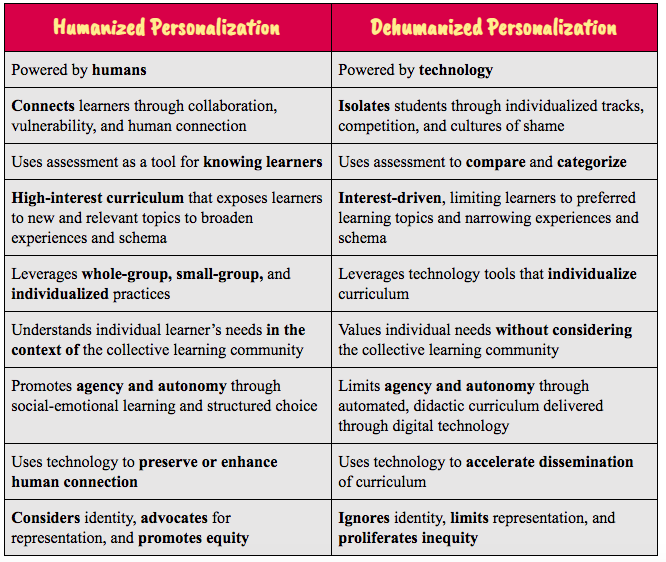
Changing my Thinking
First, I wouldn’t be where I am without the books on personalized learning that you and Kathleen wrote. I felt it was necessary to talk about your PDI chart because both of you are the thought leaders in personalized learning. I would be remiss to write a book about personalization and not include what’s already out there. Second, the way I say it is that Personalization, Differentiation, and Individualization are all connected to one another. The way I see it is that Personalization is the way to make learning meaningful and relevant to the individual. Individualization is embedded in that. Yet, we assume the teacher is individualizing the teaching for the learner. I believe that Individualization in a Personalized Learning model that is achieved through a child’s autonomy. This is about creating a curriculum where there are different points of entry for the diverse learners in your class. Differentiation works to encompass our instruction to have differentiated instruction that you are intentionally engineering for a diverse group of learners to integrate or converge with one another. There is this idea about partnerships where we connect with others who are learning together just like you and I are having through this conversation.
One of my Go-To strategies is “Turn and Talk.” It is so easy. After sharing an idea, I have the kids turn and talk about what they just heard. I ask them things like “do you agree or disagree?” That’s personalized learning right there.
5 Myths of Personalization
I think the myths are really big. I feel I could do an entire talk just on these myths. As a teacher, it is easy to do what is done. There is also a push back when questioning the status quo. One big issue for teachers is about their concerns on time but I want to talk about sustainability. Let’s consider humanization vs dehumanization for teachers like the chart above. If teachers are burnt out and exhausted every day, that’s dehumanizing. They leave work feeling undervalued or devalued, that’s dehumanizing. We have to talk about sustainability in personalized learning because it is not just another thing teachers are doing.
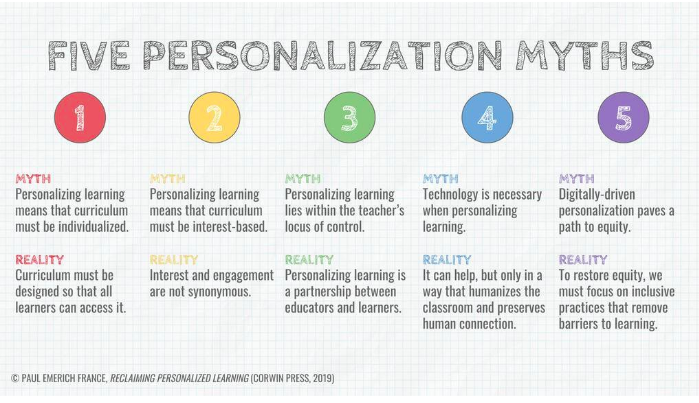
When we bring in project-based learning activities, we can make the content we are “covering” a little more sustainable. Yes, it is our duty to teach them content and skills but we can that in a more creative way. For instance, I do a project where they create a neighborhood based on the needs of the residents. They built scale models of the buildings where they are calculating area and perimeter, collaborating with their peers, and a whole logical thinking component to this. It is this really rich day where I am collecting data if they can calculate area and perimeter, multiply, and add, but it’s in this relevant, human, meaningful experience. It is about the process, not the product.
[This is Barbara: Please listen to the entire podcast and his examples and tips. A great conversation with more information than I could include in this post. Make sure you check out Paul’s new book that is coming out in October 2019 and follow his work. I learned so much about Paul just from this conversation. Enjoy!]
****
 Paul Emerich France is a National Board Certified Teacher, dedicated to helping all learners feel seen, heard, and valued in the classroom. Paul writes for a number of prominent education publications, such as Educational Leadership, Edutopia, EdSurge, and the International Literacy Association’s Literacy Today.
Paul Emerich France is a National Board Certified Teacher, dedicated to helping all learners feel seen, heard, and valued in the classroom. Paul writes for a number of prominent education publications, such as Educational Leadership, Edutopia, EdSurge, and the International Literacy Association’s Literacy Today.
Paul has taught in multiple settings, ranging from transitional kindergarten to fifth grade. He has taught in both public and independent schools, even spending a bit of time in Silicon Valley, working for an education technology company, founding three micro-schools, and building personalized learning software for the classroom. It was this experience that secured Paul’s understanding of human-centered pedagogy that prioritizes humanity over technology.
Now, Paul is a sought-after writer and speaker, having presented at SXSW EDU and serving as a keynote speaker at regional and national conferences. His teaching and thought leadership has been featured in the Atlantic, WIRED, and The New Yorker. Above all else, he enjoys connecting with his students and fellow teachers, encouraging all to have courageous conversations about identity to make learning personal for adults and children alike.
- Website: https://paulemerich.com
- Twitter: @paul_emerich
- Instagram: @paul_emerich
Writer for…
- EdSurge: https://www.edsurge.com/writers/paul-france
- Edutopia: https://www.edutopia.org/profile/paul-france
- Huffington Post: https://www.huffpost.com/author/paul-emerich-france-275
- Sage Publications: https://us.sagepub.com/en-us/nam/author/paul-e-france
Articles:
- Personalized Learning is a Problem of Privilege | EdSurge, January 2018
- Personalized Learning Isn’t About Tech | Edutopia, March 2018
- Why are we still personalizing learning if it’s not personal? | EdSurge, July 2018
- What the SAMR Model May Be Missing | EdSurge, October 2018
- It’s Time Teachers Reclaimed ‘Personalized Learning’ in the Name of Equity | EdSurge, February 2019
- Supporting LGBTQ Students in Elementary School | Edutopia, June 2019
******
For all of the Rethinking Learning podcasts with Barbara Bray, click on the podcast tab at the top, the logo below, or go to https://barbarabray.net/podcasts/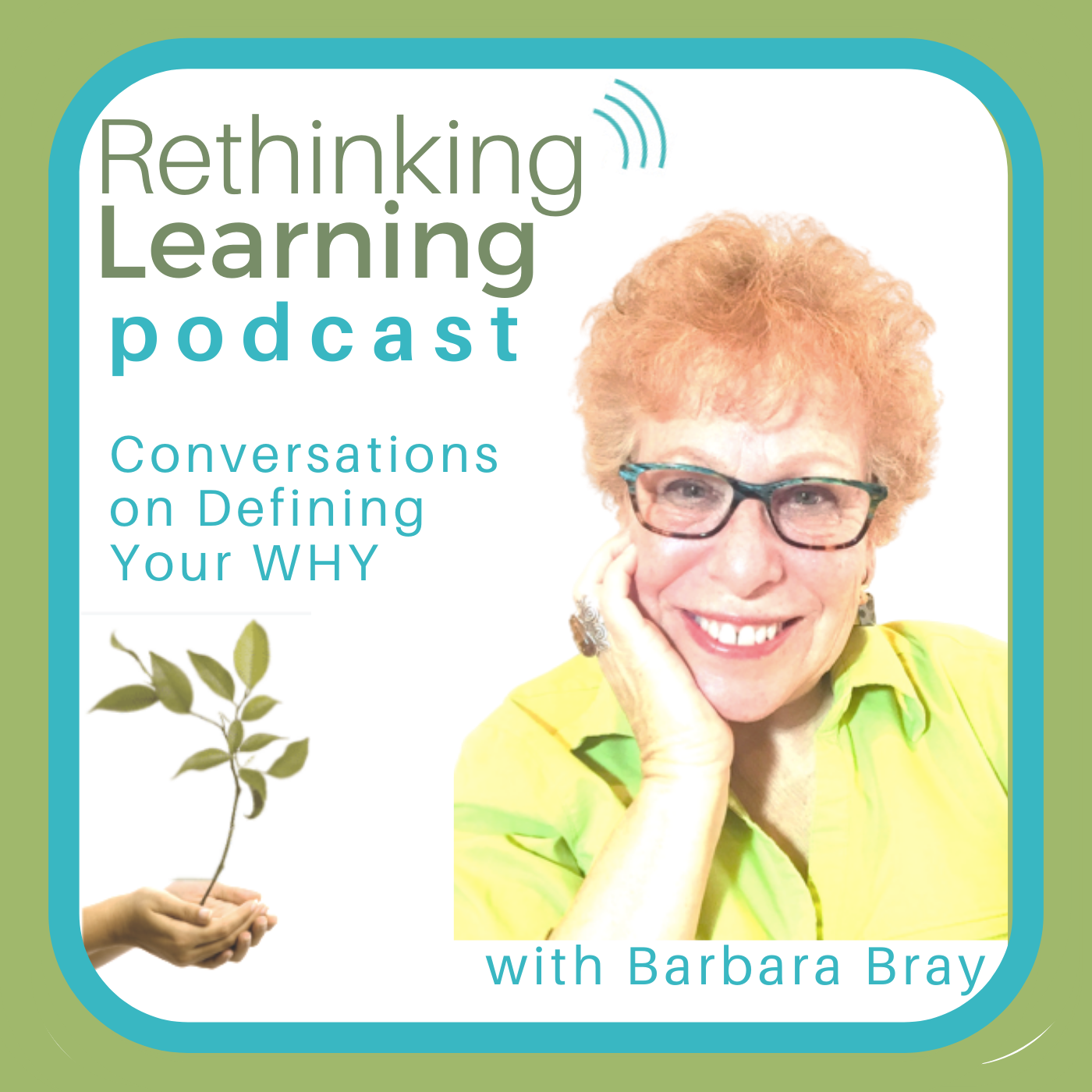
Go to this page for more information about Barbara’s new book, Define Your WHY.

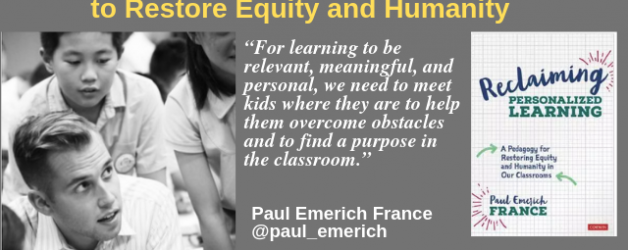


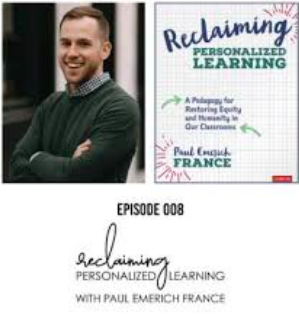
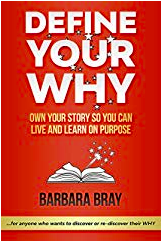


[…] Check out the podcast with Paul: Episode #78: Reclaiming Personalized Learning […]